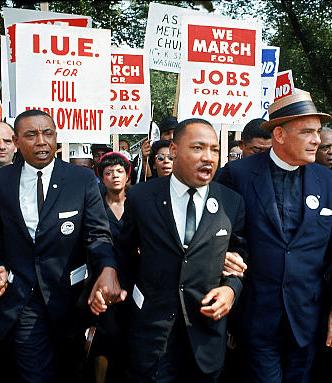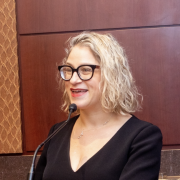
Photo Courtesy of SF Bay View
This week, as our nation participates in a Day of Service in honor of Rev. Dr. Martin Luther King, Jr., we are reminded of his commitment to freedom, justice, and civil rights for all Americans. Towards the end of his life, during the "second stage" of the Civil Rights Movement, Dr. King focused on America's poor and committed himself to "bridging the gulf between the haves and the have-notes." In collaboration with the Southern Christian Leadership Conference, Dr. King organized the Poor People's Campaign in order to address issues of economic justice, poverty, and housing. Dr. King advocated for a "guaranteed annual income," a commitment to full employment, more secure low-income housing, and systemic social change to uplift the poorest Americans. He recognized that poverty affected all types of Americans and wasn't restricted to any region, ethnicity or race.
This was the final fight of Dr. King's life. He recognized that the problems of discrimination and segregation would continue to exist if we as a nation did not address the issue of poverty. Economic justice not only goes hand-in-hand with social justice but is also a key component to any civil rights movement. Dr. King did not just mobilize the grassroots to combat poverty, he called on the government, through his Economic Bill of Rights, to pass a multi-faceted anti-poverty package. Dr. King explained the importance of alleviating poverty and the moral compulsion one should feel to do so by saying:
"Let us be dissatisfied until the tragic walls that separate the outer city of wealth and comfort and the inner city of poverty and despair shall be crushed by the battering rams of the forces of justice. Let us be dissatisfied until those that live on the outskirts of hope are brought into the metropolis of daily security. Let us be dissatisfied until slums are cast into the junk heaps of history, and every family is living in a decent sanitary home. Let us be dissatisfied until the dark yesterdays of segregated schools will be transformed into bright tomorrows of quality, integrated education."
Only a few months after launching the Poor People's Campaign, Dr. King was assassinated. He left a deep legacy for us all, and made it perfectly clear that the non-violent civil rights movement should include economic justice.
This week, with Dr. King in our minds, as we celebrate what would have been his 86th birthday, let his words ring true: "On some positions cowardice asks the question, is it expedient? And then expedience comes along and asks the question, is it politic? Vanity asks the question, it is popular? Conscience asks the question, is it right? There comes a time when one must take the position that is neither safe nor politic nor popular, but he must do it because conscience tells him it is right."
There are still 45.3 million people living in poverty, including 19.9% of children. 17.5 million households in the past year were unable to provide enough food for their families to eat. The jobless rate is slowly getting better but high unemployment still exists for African-Americans, Latinas, and veterans. And low-income housing in this country is in disrepair. As a community we need to do better in advocating for those most in need. Rabbi Abraham Joshua Heschel, a close friend and ally of Dr. King's, believed that his religious tradition not only gave him the right to speak out against injustices "but demanded it." We know an anti-poverty campaign is the right thing to do. There is no better time than right now to recommit ourselves to the cause of ending poverty in America. In fact, we need to demand it!
A version of this blog originally appeared on the Jewish Council for Public Affairs website in 2010: http://engage.jewishpublicaffairs.org/blog/comments.jsp?blog_entry_KEY=5036&t=



The views and opinions expressed in this post are those of the author(s) and do not necessarily reflect those of MomsRising.org.
MomsRising.org strongly encourages our readers to post comments in response to blog posts. We value diversity of opinions and perspectives. Our goals for this space are to be educational, thought-provoking, and respectful. So we actively moderate comments and we reserve the right to edit or remove comments that undermine these goals. Thanks!